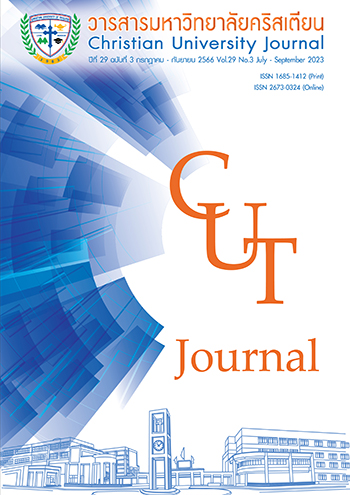การยอมรับเทคโนโลยีในการจัดทำบัญชีครัวเรือนผ่านแอปพลิเคชัน ของเกษตรกรในจังหวัดเพชรบุรี
คำสำคัญ:
บัญชีครัวเรือน, แอปพลิเคชัน, การยอมรับเทคโนโลยี, เกษตรกรบทคัดย่อ
การวิจัยนี้มีวัตถุประสงค์ 1) เพื่อศึกษาสภาพปัจจุบันของการจัดทำบัญชีครัวเรือนในชีวิตประจำวัน 2) เพื่อเปรียบเทียบระดับความพร้อมในการประยุกต์ใช้แอปพลิเคชันในการจัดทำบัญชีครัวเรือน และ 3) เพื่อศึกษาระดับการยอมรับเทคโนโลยีในการจัดทำบัญชีครัวเรือนผ่านแอปพลิเคชัน กลุ่มตัวอย่างเป็นเกษตรกรในจังหวัดเพชรบุรี คัดเลือกแบบเจาะจง จำนวน 11 กลุ่มวิสาหกิจชุมชน รวมเป็น 33 ราย วิเคราะห์ข้อมูลด้วยการวิเคราะห์เชิงเนื้อหา ค่าเฉลี่ย ส่วนเบี่ยงเบนมาตรฐาน และ t – test
ผลการศึกษาพบว่า 1) สภาพปัจจุบันของการจัดทำบัญชีครัวเรือนในชีวิตประจำวันของเกษตรกร ส่วนใหญ่มีความรู้ความเข้าใจในการจัดทำบัญชีครัวเรือนในระดับพอเข้าใจ ความสม่ำเสมอในการจัดทำบัญชีครัวเรือนแบบนาน ๆ ทำครั้ง/ไม่ได้ทำเลย 2) ระดับความพร้อมในการประยุกต์ใช้แอปพลิเคชันในการจัดทำบัญชีครัวเรือนทดสอบด้วยสถิติ t–test แบบกลุ่มตัวอย่างไม่เป็นอิสระกัน พบว่าการทดสอบค่าคะแนนเฉลี่ยก่อนการอบรมและหลังการอบรม เท่ากับ 7.939 และ 15.909 ตามลำดับ และมีค่าคะแนนเฉลี่ยของผลต่าง (d) เท่ากับ -7.969 ในภาพรวมมีคะแนนพัฒนาการของผลสัมฤทธิ์จากการอบรมเพิ่มขึ้นเฉลี่ยร้อยละ 65.38 และ 3) เกษตรกรมีระดับการยอมรับเทคโนโลยีที่ใช้ในการจัดทำบัญชีครัวเรือนอยู่ในระดับมาก เมื่อพิจารณาเป็นรายด้านอยู่ในระดับมากทุกด้าน ได้แก่ การรับรู้ถึงประโยชน์ (M=4.39, S.D.=0.548) อิทธิพลของสังคม (M=4.30, S.D.=0.529) ทัศนคติที่มีต่อการใช้เทคโนโลยี (M=4.28, S.D.=0.530) ความตั้งใจในการใช้ (M=4.27, S.D.=0.542) และความง่ายต่อการใช้งาน (M=4.01, S.D.=0.602) ตามลำดับ
เอกสารอ้างอิง
ตุลาพร จันทร์กวี และวริศรา ดวงตาน้อย. (2558). การจัดทำบัญชีครัวเรือนของเกษตรกรตำบลแม่พูล และตำบลชัยจุมพล อำเภอลับแล จังหวัดอุตรดิตถ์. วารสารวิชาการ มหาวิทยาลัยราชภัฎอุตรดิตถ์, 10(2), 113-122.
ธรรญชนก นิลมณี, ศรีสมร ผ่องพุฒิ, จุฑามาศ แซ่หว่อง, และ อรพินท์ อิ่มจงใจรักษ์. (2558). การศึกษาพฤติกรรมและสภาพปัญหาการจัดทำบัญชีครัวเรือนตามปรัชญาเศรษฐกิจพอเพียงเพื่อลดปัญหาหนี้สินของเกษตรกรจังหวัดปราจีนบุรี. นครปฐม: มหาวิทยาลัยเทคโนโลยีราชมงคลรัตนโกสินทร์.
สริยาภรณ์ ชัยชนะ, พลสราญ สราญรมย์ และสินีนุช ครุฑเมือง แสนเสริม. (2562). การใช้แอปพลิเคชันสมุดทะเบียนเกษตรกรดิจิทัลของเกษตรกร อำเภอวังทอง จังหวัดพิษณุโลก. การประชุมวิชาการระดับชาติ มหาวิทยาลัยเกษตรศาสตร์ วิทยาเขตกำแพงแสน ครั้งที่ 16: เกษตรกำแพงแสน ตามรอยพ่อ สานต่อศาสตร์แห่งแผ่นดิน (น. 3137-3144). สืบค้นจาก https://kukrdb.lib.ku.ac.th/
สัญญา เนียมเปรม. (2562). การจัดทำบัญชีครัวเรือนตามแนวคิดเศรษฐกิจพอเพียงของเกษตรกรบ้านดอนบม ตำบลเมืองเก่า อำเภอเมือง จังหวัดขอนแก่น. วารสารวิทยาลัยบัณฑิตเอเชีย, 9(1), 48-56.
สิงหะ ฉวีสุข และสุนันทรา วงศ์จตุรภัทร. (2555). ทฤษฎีการยอมรับการใช้เทคโนโลยีสารสนเทศ. วารสารเทคโนโลยีสารสนเทศลาดกระบัง. 1(1), 1-21.
สุปรียา เดชรักษา และทิพวิมล ชมพูคำ. (2560). การพัฒนาแอปพลิเคชันบัญชีรายรับ-รายจ่ายบนระบบปฏิบัติการแอนดรอยด์. วารสารโครงงานวิทยาการคอมพิวเตอร์และเทคโนโลยีสารสนเทศมหาวิทยาลัยราชฎัชมหาสารคาม, 3(1), 1-7.
สุภัทรษร ทวีจันทร์. (2556). การบูรณาการบัญชีครัวเรือนเพื่อเสริมสร้างภูมิปัญญาทางบัญชีตามหลักปรัชญาของเศรษฐกิจพอเพียง : กรณีศึกษาชุมชนบ้านกลาง ตำบลขะยูง อำเภออุทุมพรพิสัย จังหวัดศรีสะเกษ. วารสารบัณฑิตศึกษา มหาวิทยาลัยราชภัฎศรีสะเกษ, 10(48), 7-16.
อนัตพร วงศ์คำ, นริส อุไรพันธ์ และจินดา ทับทิมดี. (2564). การยอมรับเทคโนโลยีสารสนเทศ สำหรับวิสาหกิจขนาดกลางและขนาดย่อมในภาคเกษตรกรรม: กรณีศึกษาเกษตรกรในจังหวัดสุพรรณบุรี. วารสารสันติศึกษาปริทรรศน์ มจร, 9(1), 253-264.
เอมอร แสวงวโรตม์. (2557). แนวทางการจัดทำบัญชีครัวเรือนเพื่อแก้ปัญหาความยากจนของชาวบ้านในเขตห้วยจระเข้มาก อำเภอเมือง จังหวัดบุรีรัมย์. วารสารวิจัยและพัฒนา มหาวิทยาลัยราชภัฎบุรีรัมย์, 9(2), 30-39.
Best, J. W. (1981). Research in education. New jersey: Prentice-Hall.
Davis. F.D, Warshaw. P.R., & Bagozzi R.P. (1989). User acceptance of computer technology: A comparison of two theoretical models. Management Science, 35(8), 982-1003.
Fishein M., & Ajzen I. (1975). Belief, Attitude, Intention and behavior: An introduction to theory and research. Houston: Addison-Wesley Pub (Sd).
Guidetti M., Cavazza N., & Conner M. (2016). Social influence processes on adolescents’ food likes and consumption: The role of parental. authoritativeness and individual self-monitoring. Journal of Applied Social Psychology, 46( 2), 114-128.
Jia Chen, Gang Kou, Hamin Wang, & Yiyi Zhao. (2021). Influence identification of opinion leaders in social networks: An agent-based simulation on competing advertisements. Information Fusion, 76, 227-242.
John W. Best. (1981). Research in education. (4th ed). New Jersey : Prentice – Hall Inc.
Likert, Rensis. (1967). The method of constructing and attitude scale. In Fishbeic, Martin (Ed), Attitude theory and measurement. New York: Wiley & Son.
M. Sirajul Islam. (2014). Adoption of mobile of mobile phones among the farmers: A case study from rural Bangladesh. Bangladesh: Orebro University.
Nakamura K., & Kawabata H. (2017). Mediating role of memory of another person's choicein social influence on preference. Japanese Psychological Research, 59(1), 1-13.
Siriwat Phisanga, Nettika Wongsan, Nisachon Boonwisit, Sontiya Posrisub, Supkorn Waree, Sakuna Tmathong, & Narong Chaitiang. (2021). Factors associated with smartphone use among students in community health department from a University in Northern Thailand. Regional Health Promotion Center 9 Journal, 15(36), 72-83.
ดาวน์โหลด
เผยแพร่แล้ว
ฉบับ
ประเภทบทความ
สัญญาอนุญาต
ลิขสิทธิ์ (c) 2023 มหาวิทยาลัยคริสเตียน

อนุญาตภายใต้เงื่อนไข Creative Commons Attribution-NonCommercial-NoDerivatives 4.0 International License.



